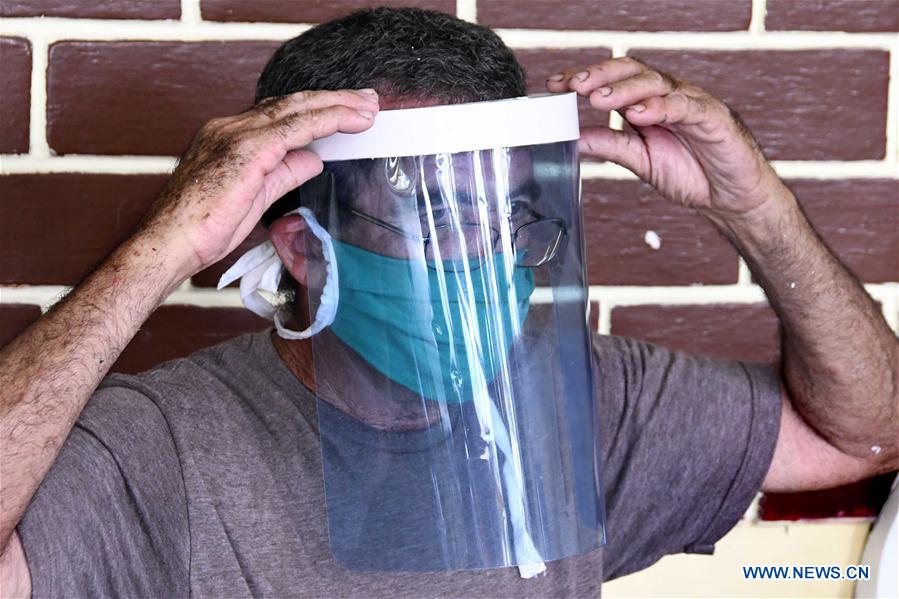
Ruben Ruiz, son of Iraida Hernandez, tries a medical face shield made of recycled materials at home on the outskirts of Havana, Cuba, May 27, 2020. Iraida Hernandez, 87, has not expected to return to her old sewing machine in her senior age, but the need to protect her family put her again in front of the yarn rollers and fabric cuts. The housewife, who lives on the outskirts of Havana, is making face masks to protect her relatives and neighbors from COVID-19. Hernandez is not alone. Her son, Ruben Ruiz, a civil construction technician, is also making medical face shields by using recycled materials. The Cuban government recently denounced Washington's policies to limit Cuba's response to COVID-19 by impeding international aid offered by friendly countries and solidarity organizations. (Photo Joaquin Hernandez/Xinhua)
by Yosley Carrero
HAVANA, May 28 (Xinhua) -- Iraida Hernandez, 87, has not expected to return to her old sewing machine in her senior age, but the need to protect her family put her again in front of the yarn rollers and fabric cuts.
The housewife, who lives on the outskirts of Havana, is making face masks to protect her relatives and neighbors from COVID-19.
"The first ones I made were mainly for taking care of my grandchildren and family, but then people in the neighborhood asked me for help. In the present situation of the COVID-19 pandemic, I can not refuse these kinds of requests," she told Xinhua.
Hernandez learned how to sew in the early 1970s during a Sewing Community Workshop convened by the Federation of Cuban Women, a social organization meant to defend the rights and emancipation of women on the island.
"The quality of homemade face masks lies in properly placing three layers of fabric. It works as an alternative to protect us from the virus because the original face masks are mainly used in hospitals," Hernandez said, while pedaling on her dusted machine.
Hernandez is not alone. Her son, Ruben Ruiz, a civil construction technician, is also making medical face shields by using recycled materials.
Ruiz, 60, told Xinhua that he always liked to innovate, and the days of isolation at home due to the pandemic motivated his creativity to do something useful for people.
Ruben delivers the face shields he made to Miguel Enriquez Teaching Hospital in Havana for doctors and nurses working in the emergency unit.
The efforts of Hernandez and Ruiz might not be remarkable, but are helping their motherland to mitigate the impacts of U.S. blockade, which hinders the import of medical supplies essential to combating the pandemic.
Raul Ruiz, another son of Hernandez, does not make medical supplies as his mother and brother do, but gives online lectures to his students who are preparing for final exams at the Enrique Jose Varona Pedagogical Institute.
Raul, who has studied the U.S. biological war against Cuba, said that Washington's attack on the health of Cubans is not something new.
The history professor is also using social media to raise awareness on the necessity to keep in mind the long list of U.S. aggressions against the Cuban revolution.
"It is impossible to forget that in 1981 counterrevolutionary organizations, trained and funded by the U.S. Central Intelligence Agency, introduced the Hemorrhagic Dengue into Cuba, killing more than 100 children. It has been part of a long and cruel story," he said.
The Cuban government recently denounced Washington's policies to limit Cuba's response to COVID-19 by impeding international aid offered by friendly countries and solidarity organizations.
A few weeks ago, the Alibaba Foundation of China failed to deliver a batch of face masks and rapid test kits to the island, since a U.S. cargo enterprise hired to carry the shipment refused to transport the donation.
In response to the new embargo measures taken by the United States against the island, Cuban President Miguel Diaz-Canel reiterated that the U.S. blockade against his country violates human rights of Cubans by preventing the arrival of the humanitarian aid from China.
"When it comes to medical supplies, limits imposed by the United States are very strong because pharmaceutical companies are subjected to blackmails, therefore they prefer not to get involved in agreements with the island," Cuban political commentator Anisley Torres told Xinhua.
"International opposition to U.S. economic sanctions against countries like Venezuela, Iran and Nicaragua has increased, for these governments do not subordinate to Washington's hegemonic interests," he added.
Despite the U.S. sanctions against Cuba, the number of patients hospitalized in COVID-19 medical centers and under epidemiological surveillance in the Latin American nation continues to decline.
So far, Cuba has 1,983 confirmed COVID-19 cases and the death toll stands at 82, according to data compiled by Johns Hopkins University.
Since he took office in the White House, U.S. President Donald Trump increased hostility toward the island by restricting family remittances and people-to-people contact, as well as punishing foreign companies doing business with Cuba.